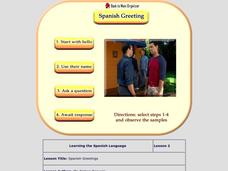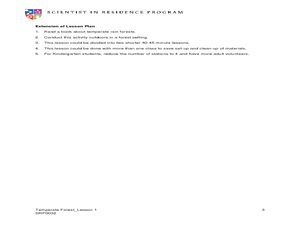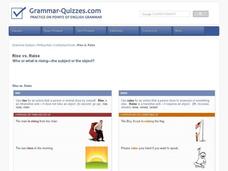EngageNY
Modeling with Inverse Trigonometric Functions 1
Where should I stand to get the best view? Pupils use inverse trigonometric functions to determine the horizontal distance from an object to get the best view. They round out the lesson by interpreting their answers within context.
Illustrative Mathematics
Shape Hunt Part 2
Shapes are everywhere in the world around us, from rectangular doors to the circular wheels of a car. The second lesson plan in this series opens the eyes of young mathematicians to this wonderful world of shapes as they search the...
Curated OER
Lesson 2- Spanish Greeting
Break down a quick conversation in Spanish. After the teacher presents the vocabulary, the class heads to the computer lab, where class members can watch a brief interactive video. The visual is one clip separated into four clearly...
Generation Rx
Medication Safety Patrol: Pharmacy Crossword Puzzle
Nine pages set to a pharmaceutical theme offers scholars the chance to complete five activities. Worksheet pages include a crossword puzzle, drawing, an object sort, and math puzzles using addition, multiplication, and division.
Curated OER
Vowels: The Long and Short: U
In this long and short vowels activity, students analyze the 8 labeled pictures of common objects. Students write the words under the correct heading: short vowel words, long vowel words. All words have long or short U.
Curated OER
Exploring Forest Objects
Students explore the forest. In this ecosystems lesson, students rotate through sensory activity centers, brainstorm, and read about temperate forests.
Curated OER
Label Tables
Students match objects to cards with the names of the objects spelled on them. Students play bingo with the new vocabulary words.
Noyce Foundation
Granny’s Balloon Trip
Take flight with a fun activity focused on graphing data on a coordinate plane. As learners study the data for Granny's hot-air balloon trip, including the time of day and the distance of the balloon from the ground, they practice...
Inside Mathematics
Winning Spinners
Winning a spin game is random chance, right? Pupils create a table to determine the sample space of spinning two spinners. Individuals determine the probability of winning a game and then modify the spinners to increase the probability...
Noyce Foundation
Parallelogram
Parallelograms are pairs of triangles all the way around. Pupils measure to determine the area and perimeter of a parallelogram. They then find the area of the tirangles formed by drawing a diagonal of the parallelogram and compare their...
Curated OER
As the Kids Come and Go: Mapping a Classroom
Map the classroom with your kids to help them understand how maps work and how to read them. The lesson starts off with a story about animals living and moving around the globe, and then kids create maps of their classroom to show how...
Curated OER
Confusing Words: Rise and Raise
In this confusing words: rise and raise worksheet, students read the explanations and examples for correct usage of these two words, then interactively complete 10 sentences for practice with immediate online feedback.
Curated OER
Magnify It!
Students view objects of various sizes from several viewing distances to discover that their visual field is limited. They record what they see and compare their observations with classmates. They conduct more structured experiments.
Curated OER
Longest, Shortest, Tallest Worksheet
Kindergartners demonstrate their ability to compare objects with a measurable attribute in common. They determine which string in a series of boxes is the longest, which cherry tree is the tallest, and write these labels on the line...
Curated OER
Many Uses of Plants
Students research and discuss non-food plant products that are in common use, and mark on a world map the name of the country where the plant is grown.
Curated OER
Abiotic and Biotic Factors
Students examine abiotic and biotic factors. They define biotic and abiotic, categorize a list of items onto a Venn diagram, label various items from areas on the school grounds as biotic or abiotic, and diagram a magazine picture.
Curated OER
Skeleton
Students study the skeleton. In this human body lesson, students draw and label bones in the body by tracing each other and creating a skeleton out of body parts and brass fastners.
Curated OER
Circles
Tenth graders explore and define the radius and diameter of a circle. In this geometry lesson, 10th graders calculate the circumference and area of a circle using real world objects and shapes. They discuss chords and lines tangent...
Curated OER
Constitution/Deer Valley
Students mount plant samples of the school community. They take samples, mount and identify. Students place cardstock on a piece of cardboard. They glue label in a corner. Students position dried plants on cardstock the way they were...
Rainforest Alliance
My Forest or the Rainforest?
The differences between tropical and temperate rainforests range from animals and flowers to climate and landscapes. Kindergarteners compare and contrast characteristics of their local forest to a tropical rainforest.
Curated OER
More on Conduction and Convection
Why do some items feel colder when they are the same temperature? How should you keep your soda cold? What makes the wind blow? These are just some of the things middle schoolers discover when completing a lesson on...
Bowels Physics
Waves and Sound
Explore how sound travels as waves with a straightforward lesson that explains the basics of waves in relation to sound. The presentation considers sound waves in both open and closed pipes and shows how to calculate wavelength and...
Curated OER
Magnetic Discovery Bottle
Pupils examine how to conduct simple investigations and use simple equipment to gather data. In this magnet lesson plan students decide what types of objects are attracted to magnets.
Curated OER
Magnify It!
Students explain that there are limits to what the eye can see and that a magnifying glass can help extend those limits. They examine an object with the magnifying glass and draw the size and shape of what they see as accurately as they...























